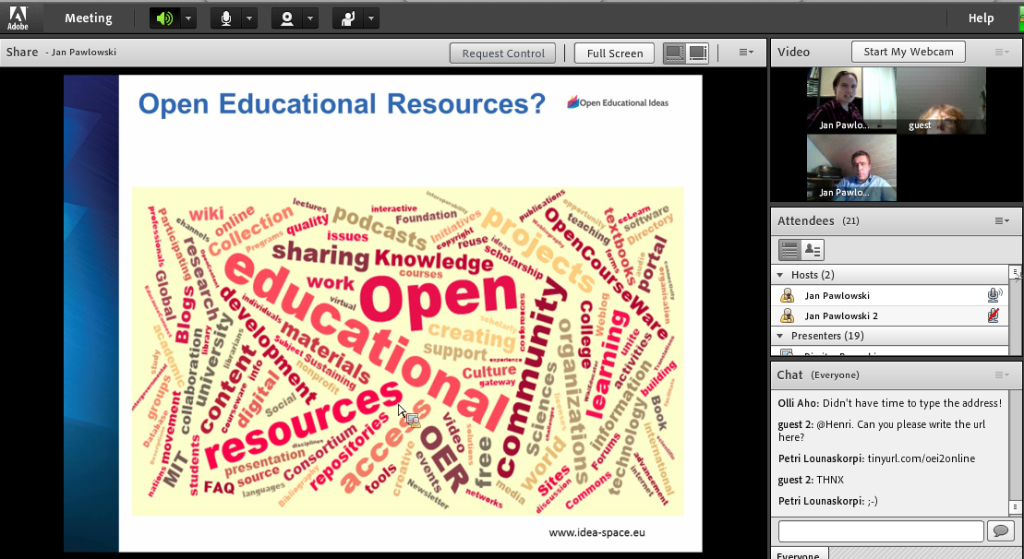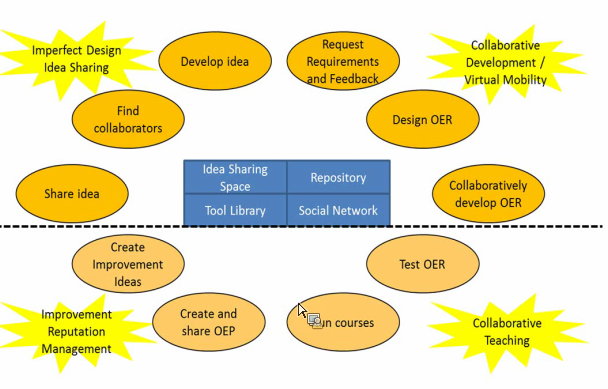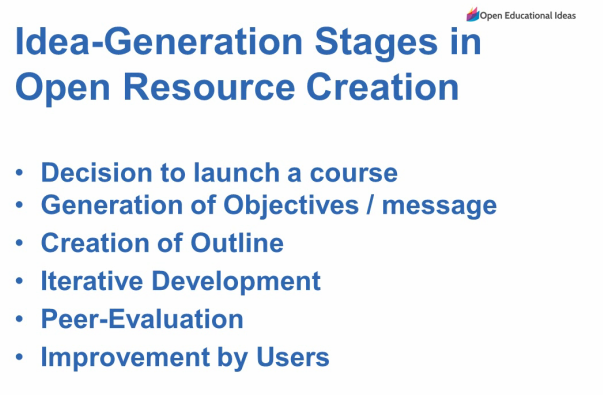Sharing Open Educational Ideas
This morning I attended the Open Educational Ideas online workshop. The 2-hour session introduced the Open Educational Ideas Project and started pulling together thoughts on how we can get educators active in sharing ideas and contributing to Open Educational Resources (OER) development at an early stage.
Initial thoughts on OER development
The session, led by Henri Pirkkalainen and Jan Pawlowski (both from
University of Jyväskylä), surfaced a few reflections on OERs that are worth mentioning here:
- OER (and online resources more generally) do not always start out as open – this has implications for how they are released, shared etc.
- Finding appropriate OERs isn’t easy – pre-selection is difficult and many educators resort to Google. The Open Education Handbook section on finding OERs demonstrates this.
- There is a difference between OERs and ‘open resources used in education’. OERs have a didactical framework i.e. they have goals for learning and teaching. There seem to be two issues here, that of ‘implied use’ and that of how ‘finished’ a resource is. Can ‘glossy’ OERs with clear learning object be more easily used by educators?
- The motiviation of the educator is important in defining how they will find and use resources. For example lack of time will lead to use of different types of resources.
- The barriers to OER use and OEP are complex but many continue to relate to culture and emotional attachment (see the SURF report for more detail
Open Educational Ideas Project
The Open Educational Ideas Project works is driven by the John Steinbeck quote:
“Ideas are like rabbits. You get a couple and learn how to handle them, and pretty soon you have a dozen.“
 The premise is that people share OERs at too late a stage. Their delivery as polished resources often means that people are less likely to use them. This is partly because educators are unable to feel an emotional attachment to these resources and despite significant cultural change there is still a “not invented here” syndrome that prevails with regard to resources.
The premise is that people share OERs at too late a stage. Their delivery as polished resources often means that people are less likely to use them. This is partly because educators are unable to feel an emotional attachment to these resources and despite significant cultural change there is still a “not invented here” syndrome that prevails with regard to resources.
The OEI Project wants to encourage Wabi-sabi principles that promote imperfection and incompleteness.
They would like people to share ideas relating to OERs in the early stages, before they are complete. These ideas may take the form of concept maps, mock ups, sketches, outlines etc. The feeling is that it is much easier to create a community of practice around an idea than a resource.
As part of the project they are taking a look at the ideas-generation stages in OER creation.
One outcome of the project is the creation of an interactive tool to support idea sharing, beta release will be in May this year.
Openly Developing Courses
During the workshop Jan Pawlowski shared his recent attempt to openly develop an online course. His insights, including acknowledgement of the enthusiasm of his ‘human theatre’, suggest that there is already an appetite for more collaboration.
Over the years I have been involved with the development of quite a few courses and online handbooks/textbooks. Most have been developed collaboratively and often in an open way. Many times have I blogged about the process and asked for feedback alongside the actual creation work (see the 2009 Jisc PoWR Project for example) . This is an increasingly popular practice. Only last week Tony Bates began to ask for suggestions for his open textbook on teaching in a digital age. However text is not necessarily intuitive and there are likely to be better workflow approaches. Open learning platforms are becoming more commonplace – see PROksi as mentioned in the workshop.
In the second half of the OEI workshop we started thinking about answers to the following questions:
- What does it take that you feel ownership for something (teaching materials, essay, idea…)
- In which situation would you consider sharing your educational ideas?
- Where would you share?
- Which tools would you use?
- How to best express new ideas and innovations?
- How would you structure your collaboration process?
Our answers were collated in a Google doc and make for interesting reading, they will start to form the basis for the project research and activity.
A recording of the webinar is now available online.
If you are interested in being involved then there is an OEI Facebook group where discussions will continue. Or alternately send your thoughts in to the Open Education Working Group.
 Open Education Working Group
Open Education Working Group 






“There is a difference between OERs and ‘open resources used in education’. OERs have a didactical framework i.e. they have goals for learning and teaching. There seem to be two issues here, that of ‘implied use’ and that of how ‘finished’ a resource is. Can ‘glossye’ OERs with clear learning object be more easily used by educators?”
Not sure I agree with this – I don’t believe OERs have to have “goals” and surely “finished” is a problem term?
The Wabi-sabi stuff and “finished” can just be solved by sharing all of the ingredients that make up an OER (should the OER contain parts).
Hi Pat,
Sorry if I made this sound like agreed thoughts, they were more musings from different individuals. The issues you have picked up on are precisely those that the project is exploring.
So to ask you a couple of questions – what are the elements that make up an OER? How can they be shared?
The Open Educational Ideas project is hoping to come up with some possible answers.
Marieke
Marieke
Things is, I don’t think it needs exploring. OER gets dressed in a lot of “additionals” on what are, basically, licensed materials with education in mind.
Say an OER with a video and audio and a quiz. Logically to be more open, you’d share the video, audio and quiz separately. This is where – http://blogs.it.ox.ac.uk/openspires/2012/03/27/an-oer-star-rating/ – kicks in. It’s basically “show your working”.
Or, alternatively, make an OER breaker tool. Takes pics out of PDFs, stills from videos, bits of MP3s and so on
The OER tool economy is pretty bad though, not a lot out there.
Hi Pat,
I totally get what you are saying. When I created the immersive informatics materials (http://immersiveinformatics.org) I reused lots of content. The first thing I did was trawl what there was already and created a spreadsheet. “I want the video from here, I want the quiz from there, I want the image from here” etc.
However my understanding is that the OEI project want to take a further step back, so sharing the ideas behind the development – mind maps, sketches etc. They are also creating a tool to help organise these ideas – no idea what it is going to be yet, but could be something pretty cool – and as you say the tool economy is not great.
I’d suggest you share your thoughts with the OEI Project team – I’m sure they’d be really interested to hear them.
Marieke
I think though you just need a community – a place people can go to meet similar minded people and then see what happens.
I tend to shy away from anything efquel – I have real concerns with openness and quality initiatives
Hi Pat,
Lot’s of good discussion here!
Om OEI we’re looking at the community aspect from a new direction. The thing is that there are already various communities for teachers to share and discuss OER but these teachers still seem to have a hard time adopting OER.
In OEI we look at collaborative development of OER in specific. This is something that hasn’t really been touched upon existing OER initiatives. We wouldn’t build any own community tool but a lightweight idea generator where a person can structure and link different groups and artefacts together.
So it is not really that we are challenging OER, we’re just exploring ways to get teachers actually collaborating in OER development.
Hi Marieke,
As far as I can see the OEI project is trying to solve the problems with sharing/creating OER even before they are constructed…There is a great deal of problems that arise while working with OER so having a framework for creation of OER would be really great: it would solve the issues that might arise even before sharing OER…If the OEI project is aiming at finding the barriers that OER creators might have it would establish a framework that can help in defining the pre-conditions. I still think Prof. Pawlowski can further explain the concept behind the OEI since I just find out about the project. However, it is really interesting having different approach toward the OER issues and I think that OEI is one of those cases.
“As far as I can see the OEI project is trying to solve the problems with sharing/creating OER even before they are constructed” sounds like a great plan but I am not sure how you will know what the problems will be before you get to the reuse point. It is possible to create some lovely technically reusable resources (OER) which appear to be offering all the right things. But usually the people available to talk and plan at the early stages of the resource lifecycle are not the same people (not even the same kind of roles) as those who are looking for items to reuse when the resource is published, The more open the resource the more problematic the prospect of planning for it.
I am concerned about who will be sharing ideas. Will they be users of resources (involved in the later stages of the reuse lifecycle). If not how will they get access to the ideas of users?
Chris
Hi Chris,
Thank you for commenting…I am not part of the OEI project and I am also trying to understand the whole concept behind it. Take a closer look at the Henri Pirkkalainen comment in the discussion above…